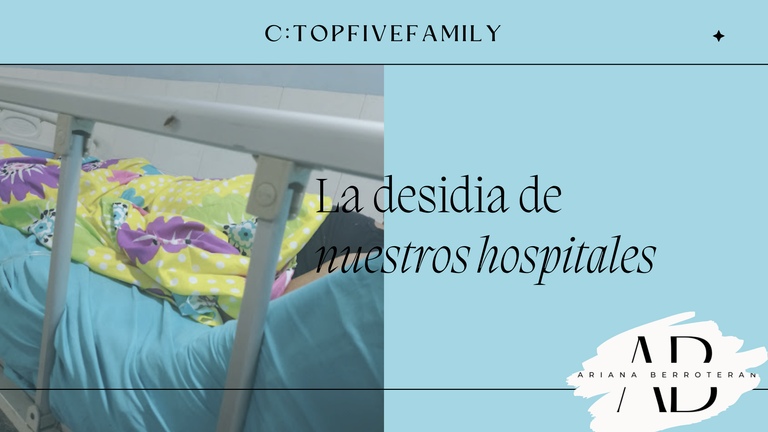
Hola a todos en esta interactiva comunidad de TopFiveFamily. Espero que se encuentren super bien y muchas personas se unan a esta iniciativa de Observa, Piensa, Escribe que fomenta en los usuarios la capacidad de contar historias, a partir de una foto que alguien más tomó y significó algo totalmente diferente que para el resto.
En esta ocasión, la foto es propiedad de @lanzjoseg y nos muestra un pasillo de hospital. Esta sencilla fotografía puede mover tantos sentimientos en nuestro interior. Aunque normalmente un hospital sea sinónimo de enfermedad, también se asocia con nacimiento, con vida, porque en la actualidad todos nacemos en un hospital o clínica.
Sin embargo, en esta ocasión, les quiero contar un poco acerca de la realidad de nuestros hospitales en Venezuela. Una realidad que viví hace unos meses y que deseo de todo corazón nadie tenga que pasar por ella.
Hello to everyone in this interactive TopFiveFamily community. I hope you are doing super well and many people are joining this Observe, Think, Write initiative that fosters in users the ability to tell stories, starting from a photo that someone else took and meant something different than the rest.
On this occasion, the photo is owned by @lanzjoseg and shows us a hospital hallway. This simple photograph can move so many feelings inside us. Although normally a hospital is synonymous with illness, it is also associated with birth, with life, because nowadays we are all born in a hospital or clinic.
However, on this occasion, I want to tell you a little about the reality of our hospitals in Venezuela. It is a reality that I lived a few months ago and I wish with all my heart that no one has to go through it.
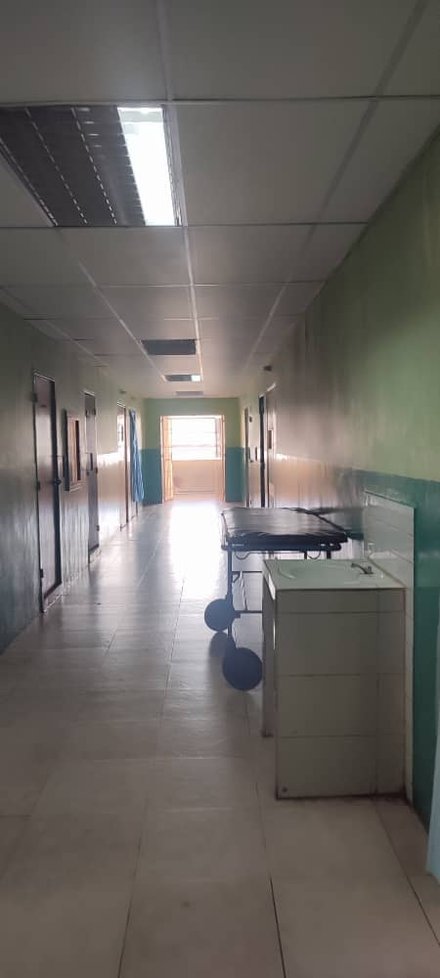
Imagen del concurso, propiedad @lanzjoseg
Cuando viví la realidad hospitalaria
En el mes de noviembre, a mi papá le dio un ACV. Ni mi mamá, mi hija ni yo estábamos en casa. Ese día fuimos a Caracas para comprar unas cosas, y mi papá dijo que tenía dolor en la cadera, así que decidió quedarse en casa. A eso de las 5 de la tarde, nos empieza a llamar porque se cayó cuando se estaba parando de la cama y nos dijo que no podía levantarse del piso.
Inmediatamente, llamé a una vecina y su esposo, quienes nos ayudaron a ver qué pasaba con mi papá. En ese momento, tuvieron que llamar a otros vecinos, a los bomberos y finalmente trasladaron a mi papá al Hospital de Guatire, donde vivimos. Nosotras llegamos directo hasta allá.
Gracias a Dios, otra vecina fue con mi papá, porque de haberlo trasladado solo, no le prestaban la atención médica, según nos informaron. Al llegar, entramos y hablamos con la doctora de guardia. Nos explicó que mi papá tenía una crisis hipertensiva, que le habían puesto tratamiento con Nifedipina y debía estar en observación, que le buscáramos el tratamiento que suele tomarse.
When I lived in the hospital reality
In November, my father had a stroke. Neither my mother, my daughter nor I were at home. That day we went to Caracas to buy some things, and my dad said he had pain in his hip, so he decided to stay home. At about 5:00 p.m., he started calling us because he fell when he was getting out of bed and told us he couldn't get up from the floor.
Immediately, I called a neighbor and her husband, who helped us see what was wrong with my dad. At that moment, they had to call other neighbors, the firemen, and finally, they took my dad to the Hospital of Guatire, where we live. We went straight there.
Thank God, another neighbor went with my father because if they had taken him alone, they would not have given him medical attention, according to what we were told. When we arrived, we went in and spoke to the doctor on duty. She explained to us that my father had a hypertensive crisis, that he had been treated with Nifedipine that he should be under observation, and that we should look for the treatment he usually takes.
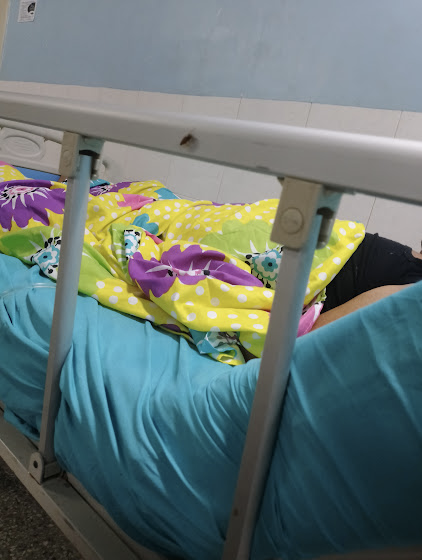
En esta imagen se puede ver a una chiripa en la camilla
¿Qué pasó con la atención y la vocación?
Esto sucedió un sábado, así que la emergencia estaba un poco congestionada. Aunque, creo que es deber de los doctores y enfermeros estar al pendiente de los pacientes, esto no sucedía. Yo debía estar detrás de ellos cada vez que notaba que a mi papá se le podía estar subiendo la tensión, porque no tienen equipos y le quitaban el monitor a uno para ponérselo al otro.
Iba detrás de las enfermeras pidiéndoles por favor que le tomarán la tensión a mi papá, su respuesta era que lo tenía que indicar el médico. Durante los días que pasamos en el hospital, los médicos me veían mal, pues siempre estaba detrás de ellos para que pudieran estar monitoreando a mi papá.
Las enfermeras no eran amables, algunas me dijeron que todo la limpieza y cuidados de mi papá, corrían por cuenta del familiar. Lo peor era la forma en la que te decían las cosas. Eso sí, durante las mañanas no dejaban a uno estar adentro de la sala y yo no podía entender cómo se podía atender al paciente.
Por su parte, los camilleros brillaban por su ausencia. Eso sí, las pocas veces que aparecieron no eran amables, no tenían vocación de servicio. Hubo uno, que no solo le gritó a mi papá, me lo dejó mal tirado en la cama. Los vigilantes, se creían dueños del hospital, daban información errada o no respondían si les hacían alguna pregunta.
Fue una experiencia aterradora, que terminó cuando conseguimos trasladar a mi papá a otro centro hospitalario.
What happened to care and vocation?
This happened on a Saturday, so the emergency room was a bit congested. Although I think the doctors and nurses must be attentive to the patients, this was not happening. I had to be behind them every time I noticed that my dad's blood pressure might be rising because they don't have equipment and they would take the monitor off one and put it on the other.
I would go after the nurses asking them to please take my dad's blood pressure, and they answered that the doctor had to indicate it. During the days we spent in the hospital, the doctors looked at me badly, because I was always behind them so they could be monitoring my dad.
The nurses were not kind, some of them told me that all the cleaning and care of my dad was on the family's account. The worst thing was the way they told you things. Of course, during the mornings they did not let you inside the ward and I could not understand how the patient could be attended.
The orderlies were conspicuous by their absence. Of course, the few times they appeared, they were not kind, they had no service vocation. There was one who not only yelled at my dad but also left him lying on the bed. The security guards thought they owned the hospital, gave wrong information, or did not answer any questions.
It was a terrifying experience, which ended when we managed to transfer my dad to another hospital.
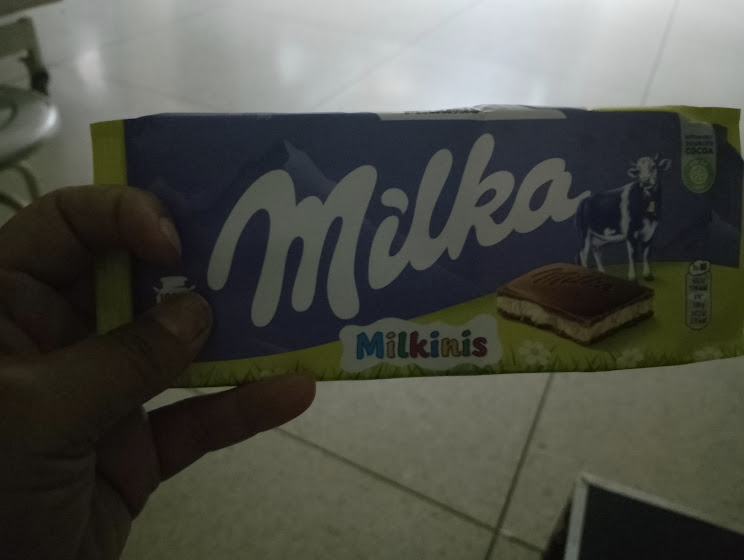
Pasé mi cumpleaños en el hospital con mi papá, mi mayor regalo fue que mi papá está con nosotras
Falta de insumos
Algo que vivimos durante esos días es la falta de insumos en los hospitales. No sólo no tienen medicinas, no tienen equipos, no tienen personal, no tienen limpieza, nada. Mientras estuvimos allí, llegó un señor con un infarto, la doctora de guardia se me acercó y me dijo que si podía hacer una obra de caridad. Al preguntarle qué necesitaba, me respondió que, si podía donar cuatro aspirinas de mi papá, porque no tenían el protocolo de infarto completo.
Estando allí, tuve que comprarle a mi papá varias ampollas de medicamentos para bajarle la tensión. Tuve que comprar todo lo que usaron para mantenerlo estable. Recuerdo que pedimos un pito para que mi papá pudiera orinar y nos indicaron que ellos no contaban con nada de eso, que usáramos una botella de agua.
También presencié como llegaban pacientes con heridas graves, custodiados por la policía, con muchas patologías y eran regresados porque no tenían nada para tratarlos. Uno de los días, llegó una muchacha con mucho dolor de barriga, su esposo dice que ella no quería y tenía toda la razón, pues le indicaron que si quería que la atendieran fuera a comprar unos medicamentos y regresara.
Lo más triste de todo, son las condiciones tan críticas en las que se encuentra el hospital. El personal de limpieza, sólo lo llegué a ver en ciertas ocasiones, sobre todo en la mañana, de resto todo siempre estaba igual. A los techos les faltan láminas y de ahí caen chiripas, yo no lograba dormir pendiente de qué no le cayeran a mi papá. Pues, conseguí algunas caminando por la cama. Gracias a Dios se escuchan bastantes limpia casas que son los encargados de mantener el orden por lo visto.
Los baños no deberían estar en funcionamiento, y aquí también entran los usuarios quienes ensucian y no son capaces de mantener la limpieza. No todo el tiempo hay agua, tal como pasa en el país.
Lack of supplies
Something we experienced during those days was the lack of supplies in the hospitals. Not only do they have no medicines, they have no equipment, no staff, no cleaning, nothing. While we were there, a man arrived with a heart attack, the doctor on duty approached me and asked me if I could do some charity work. When I asked him what he needed, he told me if I could donate four of my dad's aspirin, because they didn't have the complete protocol for a heart attack.
While I was there, I had to buy several vials of medication for my dad to lower his blood pressure. I had to buy everything they used to keep him stable. I remember we asked for a whistle so my dad could urinate and they told us that they didn't have anything like that, that we should use a bottle of water.
I also witnessed how patients with serious injuries arrived, guarded by the police, with many pathologies, and were sent back because they had nothing to treat them. One of the days, a girl arrived with a lot of pain in her stomach, her husband said that she did not want to and she was right because they told her that if she wanted to be treated, she should go and buy some medicine and come back.
The saddest thing of all is the critical condition of the hospital. I only saw the cleaning staff on certain occasions, especially in the morning, otherwise, everything was always the same. The roofs are missing sheets of sheeting and some of them fall from there, and I couldn't sleep, just to make sure that they didn't fall on my dad. Well, I managed to get some by walking across the bed. Thank God we hear a lot of house cleaners who are in charge of keeping order.
The toilets are not supposed to be in operation, and this is also where the users come in who make a mess and are not able to maintain cleanliness. Water is not available all the time, as it is in the country.
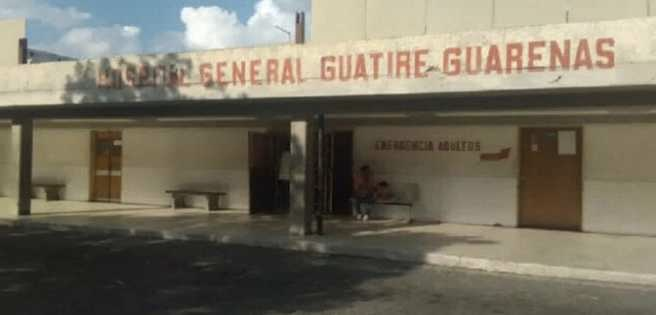
Imagen tomada de 2001
Falta de empatía
En el otro centro hospitalario al que trasladamos a mi papá, también hubo carencias de insumos, no está en las mejores condiciones tampoco. Si embargo, las cosas funcionan un poco mejor, la atención tanto de médicos como enfermeras es muy diferente. Siempre consigues a una persona que no encaja, pero de verdad que nada que ver con lo que vivimos en el hospital.
Lo que, si pude notar en ambos centros de salud, es que los que más carecen de empatía son los doctores. No todos, ojo, pero lamentablemente es así. Durante los días que estuvimos en el primer hospital, los médicos no estaban del todo pendientes, dejaban que estudiantes hicieran los procedimientos incluso más delicados como poner una sonda y cuando veían que lo estaban haciendo mal, es que intervenían.
Su forma de hablarle a los pacientes, de decir las cosas, todo está como contaminado con la falta de empatía. Algunos doctores realizando ya sus postgrados, te ven y hablan con superioridad, como si tú no entendieras lo que ellos te dicen. Muchachos muy jóvenes, que al parecer creen que por tener una carrera de medicina son más, cuando en esta Venezuela, las cosas están difíciles para la gran mayoría.
Por último, esta falta de empatía viene acompañada de corrupción. Estando en ambos hospitales, me enteré por trabajadores de diferentes áreas que los mismos médicos o enfermeras ofrecen diferentes insumos a precios elevados, por supuesto que no todos. Al igual, que sí conoces a alguien te dan una atención diferente. Esto, aunque es común en muchos lados, me sigue pareciendo tan triste porque todos tenemos los mismos derechos.
Con mi participación no solo me desahogué, sino que capaz pude mostrar un poco de la situación de los hospitales en Venezuela. Situación que espero que mejore rápido, por el bien de un país entero.
Les dejo mis redes sociales por si quieren seguirme y un abrazo lleno de todo el cariño del mundo.
Twitter: @ariale
Instagram: @arialeval
Tik Tok: @arialerai
Lack of empathy
In the other hospital to which we transferred my father, there was also a lack of supplies, it is not in the best condition either. However, things work a little better, the attention of both doctors and nurses is very different. You always get a person who doesn't fit in, but it has nothing to do with what we experienced at the hospital.
What I noticed in both health centers is that the ones who lack empathy the most are the doctors. Not all of them, of course, but unfortunately this is the case. During the days we were in the first hospital, the doctors were not at all attentive, they let students do even the most delicate procedures such as putting in a catheter and when they saw that they were doing it wrong, they intervened.
The way they talk to patients, the way they say things, everything is contaminated with a lack of empathy. Some doctors, already doing their postgraduate studies, look at you and speak with superiority, as if you did not understand what they were saying. Very young people, apparently believe that because they have a medical degree, they are better, when in this Venezuela, things are difficult for the vast majority.
Finally, this lack of empathy is accompanied by corruption. Being in both hospitals, I learned from workers in different areas that the same doctors or nurses offer different supplies at high prices, of course not all of them. Likewise, if you know someone, they give you different attention. Although common in many places, this still seems so sad to me because we all have the same rights.
With my participation, not only did I let off steam, but I was able to show a little of the situation of the hospitals in Venezuela. I hope this situation will improve quickly for the good of the whole country.
Thank you for making it this far, and for reading me. Text originally written in Spanish and translated by DeepL Translate. I'm sorry if there are any mistakes.
I leave you my social networks in case you want to follow me:
Twitter: @ariale
Instagram: @arialeval
Tik Tok: @arialerai

Congratulations @ariale! You have completed the following achievement on the Hive blockchain And have been rewarded with New badge(s)
Your next target is to reach 3000 upvotes.
You can view your badges on your board and compare yourself to others in the Ranking
If you no longer want to receive notifications, reply to this comment with the word
STOPThank you so much :)
Keep up the fantastic work @ariale! Your dedication and hard work will pay off when you reach your target.